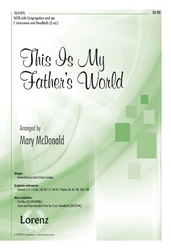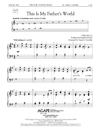- |
User Links
This Is My Father's World

This is my Father's world And to my listening ears
Author: Maltbie D. Babcock (1901)Tune: TERRA BEATA
Published in 331 hymnals
Printable scores: PDF, MusicXMLPlayable presentation: Lyrics only, lyrics + musicAudio files: MIDI, Recording
Representative Text
1 This is my Father's world,
And to my listening ears
All nature sings, and round me rings
The music of the spheres.
This is my Father's world:
I rest me in the thought
Of rocks and trees, of skies and seas--
His hand the wonders wrought.
2 This is my Father's world:
The birds their carols raise,
The morning light, the lily white,
Declare their Maker's praise.
This is my Father's world:
He shines in all that's fair;
In the rustling grass I hear Him pass,
He speaks to me everywhere.
3 This is my Father's world:
O let me ne'er forget
That though the wrong seems oft so strong,
God is the Ruler yet.
This is my Father's world:
Why should my heart be sad?
The Lord is King: let the heavens ring!
God reigns; let earth be glad!
Sing Joyfully, 1989
Author: Maltbie D. Babcock
 Maltbie D. Babcock (b. Syracuse, NY, 1858; d. Naples, Italy, 1901) graduated from Syracuse University, New York, and Auburn Theological Seminary (now associated with Union Theological Seminary in New York) and became a Presbyterian minister. He served the Brown Memorial Presbyterian Church in Baltimore, Maryland, and the Brick Presbyterian Church in New York City. In Baltimore he was especially popular with students from Johns Hopkins University, but he ministered to people from all walks of life. Babcock wrote hymn texts and devotional, poems, some of which were published in The School Hymnal (1899).
Bert Polman… Go to person page >
Maltbie D. Babcock (b. Syracuse, NY, 1858; d. Naples, Italy, 1901) graduated from Syracuse University, New York, and Auburn Theological Seminary (now associated with Union Theological Seminary in New York) and became a Presbyterian minister. He served the Brown Memorial Presbyterian Church in Baltimore, Maryland, and the Brick Presbyterian Church in New York City. In Baltimore he was especially popular with students from Johns Hopkins University, but he ministered to people from all walks of life. Babcock wrote hymn texts and devotional, poems, some of which were published in The School Hymnal (1899).
Bert Polman… Go to person page >Text Information
Related Texts
| First Line: | This is my Father's world And to my listening ears |
| Title: | This Is My Father's World |
| Author: | Maltbie D. Babcock (1901) |
| Meter: | 6.6.8.6 D |
| Place of Origin: | United States |
| Language: | English |
| Publication Date: | 1901 |
| Notes: | Spanish translation: See "El mundo es de mi Dios" by George Paul Simmonds |
| Copyright: | Public Domain |
- Year A, Easter season, Day of Pentecost
This is recommended for Year A, Easter season, Day of Pentecost by 2 hymnal lectionary indexes including Glory to God: the Presbyterian Hymnal #370. - Year A, Ordinary Time, Trinity Sunday
This is recommended for Year A, Ordinary Time, Trinity Sunday by 2 hymnal lectionary indexes including Lift Up Your Hearts: psalms, hymns, and spiritual songs #21. - Year B, Easter season, Day of Pentecost
This is recommended for Year B, Easter season, Day of Pentecost by 2 hymnal lectionary indexes including Glory to God: the Presbyterian Hymnal #370.
Chinese (Mandarin)
English
- 112 Familiar Hymns and Gospel Songs #111
- A Hundred Songs of God and His Kingdom #d84
- A Hymnal for Friends #135
- A Hymnal for Joyous Youth: An all-purpose hymnal for church, young peoples' services and Sunday schools #45
- A Junior's Praise #13
- A Service Hymn Book #d146
- A Teaching Hymnal: ecumenical and evangelical #122
- African American Heritage Hymnal #149
- African Methodist Episcopal Church Hymnal #47
- Alleluia: a hymnal for use in schools, in the home, in young people's societies in devotional meetings #180 10 shown out of 240
Korean
Spanish
Tune
TERRA BEATATERRA BEATA was originally a traditional English folk tune, a variant of which, entitled RUSPER, appeared in The English Hymnal in 1906. Franklin L. Sheppard (b. Philadelphia, PA, 1852; d. Germantown, PA, 1930) arranged the tune for Babcock's text and published it in the Presbyterian church school h…
For Leaders
In ancient times, people believed that as the planets revolved in the universe, they made music or harmony. This is the belief Maltbie Babcock referred to in the line, “and round me rings the music of the spheres.” Though this belief has since been disproven, we know that objects in space do in fact emit sounds. Even more amazing, the ocean is also making noices at its very lowest and darkest depths - sounds which scientists are still unable to identify. The whole universe is singing a song of its creation, revealing something to us about He who created it. But, as Albert Bailey writes, “in stanza three, the author realizes that all’s not right with the world” (The Gospel in Hymns, 553). Creation is fallen and broken. Yet, it also still belongs to God. We are thus charged to listen attentively to the voice of God in His world – from the heights of space to the depths of the ocean - and witness how He restores it, listening for our own calling to be stewards of Creation.
Text:
Maltbie D. Babcock wrote this poem in sixteen stanzas of four lines each. Some hymnals, such as the Presbyterian Hymnal and The Psalter Hymnal include only two verses. There are a number of variations in how the phrases are arranged. For example, The Worshiping Church uses the first four lines of verse two as the first half of verse two, and the last four of verse two as the first half of verse three. There are also a number of changes in the text. The Worshiping Church and Worship and Rejoice end verse two with, “He trusts us with his world, to keep it clean and fair – all earth and trees, all skies and seas, his hand the wonders wrought.” A number of hymnals, including the Baptist Hymnal 1991, end the third stanza with “The battle is not done; Jesus who died shall be satisfied, And earth and heaven be one.”
Tune:
TERRA BEATA, Latin for “beautiful world” was originally a traditional English folk tune. It was arranged by Franklin L. Sheppard for Babcock’s text. This light and lilting tune requires bright foundation stops or instrumentation, such as guitars, recorders, flutes, or upper-register piano. Watch out for weightiness – keep the tempo moving and the instrumentation light. Fernando Ortega has a very simple and beautiful piano-led version of the hymn.
When/Why/How:
This hymn is very easily learned by children, and is a very popular Sunday School song or children’s choir piece. It can be sung as a hymn of praise during any service, but fits particularly well in services focusing on creation, providence, or stewardship. You could sing this as an opening hymn, after a litany about creation and God’s providence for His people, or as a closing hymn. It could be very powerful to pray that God would reveal Himself to His people, and that we would be ready and listening for His presence. Follow this with a time of silence in which you calm your hearts to listen, and then sing this hymn.
Suggested music:
- McDonald, Mary. This Is My Father's World - for Choir, Congregation and Piano
- Raney, Joel. He's Got the Whole World/This Is My Father's World - for Children's Choir or Adult Choir
- Funderburk, Duane. Hymns to the Creator: Two Arrangements for Violin and Piano
- Hobby, Robert A. Three Hymns of Praise. Set 4 - for Organ
- Shackley, Larry. All Nature Sings (Piano hymn settings that celebrate the Creator and the beauty of His creation)
- Geschke, Susan. This Is My Father's World - Handbell medley of "This Is My Father's World" and "Children of the Heavenly Father"
Laura de Jong, Hymnary.org
Timeline
Arrangements
Media
Sing Joyfully #40
The United Methodist Hymnal #144
- MIDI file from Baptist Hymnal 1991 #43
- MIDI file from Baptist Hymnal 1991 #43
- Audio recording from Baptist Hymnal 2008 #46
- MIDI file from The Cyber Hymnal #6766
- MIDI file from Devotion and Praise #259
- Audio recording from Evangelical Lutheran Worship #824
- Audio recording from Glory to God: the Presbyterian Hymnal #370
- Audio recording from Lift Up Your Hearts: psalms, hymns, and spiritual songs #21
- Audio recording from Lift Up Your Hearts: psalms, hymns, and spiritual songs #21
- Audio recording from Lift Up Your Hearts: psalms, hymns, and spiritual songs #21
- MIDI file from Psalter Hymnal (Gray) #436
- Audio recording from Small Church Music #128
- Audio recording from Small Church Music #128
- Audio recording from Sing Joyfully #40
- MIDI file from Sing Joyfully #40
- Audio recording from Trinity Hymnal (Rev. ed.) #111
- Audio recording from The Worshiping Church #384
- MIDI file from The United Methodist Hymnal #144
- Audio recording from The United Methodist Hymnal #144
- MIDI file from Worship and Rejoice #21
- MIDI file from With Heart and Voice: songs for all God's children #114
- MIDI file from Worship in Song: A Friends Hymnal #29


 My Starred Hymns
My Starred Hymns







